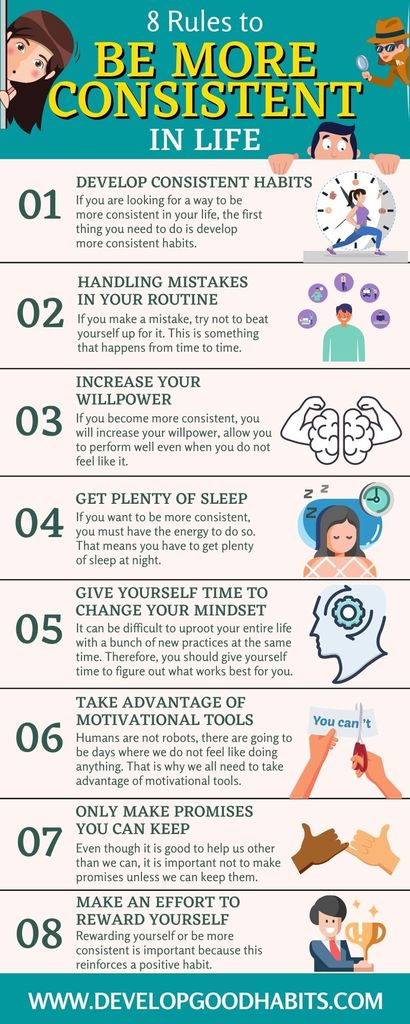8 Rules to Be More Consistent in Life Leave a comment
Life has its ups and downs. Although this rollercoaster ride is part of living in this world, everyone is looking for ways to be more consistent.
With consistency, you will have an easier time maintaining relationships with your family members and friends, meeting your goals, and performing well in school or at work.
Unfortunately, many people struggle with maintaining consistency in their lives. How can you be more consistent?
In this article, I will provide eight rules to increase your consistency. However, let’s begin with a straightforward definition.
What Is Consistency?
Consistency means different things in different situations; however, the definition of consistency is making a consistent effort day in and day out, no matter what you do. There are numerous ways to apply consistency.
For example, students need to work consistently hard in their classes, and employees and managers should do the same in their jobs every day.
Everyone should be consistent in the effort they put forth in their relationships with their family members, friends, and colleagues. (For a more philosophical understanding of consistency, here’s our collection of our favorite consistency quotes.)
To achieve your goals and maintain healthy relationships, it is essential to be consistent in your efforts. Even though it is not possible to be at your best every day, you should strive to do your best every day. That is the consistency you should strive for.
Although it may be difficult, you can make this easier on yourself in a few ways.
Now, let’s dive into the eight rules for greater consistency.
1. Develop Consistent Habits
If you’re looking for a way to be more consistent in your life, you first need to develop consistent habits. You will be more consistent only if you start from the ground up.
There are a few ways you can do precisely that. These include:
Be Realistic in Your Goals
You will have a difficult time being consistent if you do not have an idea of what you need to do. Therefore, create easy, simple goals with objective results that are easy to measure.
You could start by defining what consistency means to you. Then, it would be best if you devised smaller steps to follow to reach that goal.
Discover 47 Essential Daily Habits to Increase Consistency
Stick to a Schedule
To be consistent, you need to know what you must do on a daily basis. Therefore, you should create a schedule for yourself.
Whether you use a planner, a calendar, or a list of reminders on your phone, this will help you stay on track. You will determine what commitments you can and cannot make time for.
How to Create a Schedule and Stick To It
Use Reminders
This is a new habit, so you must remind yourself what you are doing. Try to place reminders on your belongings, around your home, and throughout your workspace or school.
It’s easy to forget new commitments and calls, especially when trying to adjust to a new routine. Place messages in visible locations to remind yourself throughout the day.
Here are a few ways to develop more consistent habits. To achieve consistency throughout your day, you need to live a consistent life.
If you want to learn how to build consistent habits, be sure to check out our eight-step process for forming new habits.
2. Handling Mistakes in Your Routine
No matter how hard you try to be consistent, you will make mistakes from time to time. Therefore, try to keep going even if you make a mistake.
Even if you are incredibly organized, you will occasionally slip up. Therefore, you should plan for mistakes along the way. If you make a mistake, try not to beat yourself up about it. This occurs from time to time.
Even if you break a promise, miss a deadline, or have to cancel on someone, this doesn’t necessarily mean you’re ruining your consistency. External factors can get in the way.
Although it is essential to plan for these external factors and try to prevent them from derailing our progress, it will happen occasionally.
Always figure out what you can do next. That way, you can improve. Remember that consistency and perfection are not the same thing. Nobody is perfect. Be forgiving of yourself; however, do not let things fall through the cracks.
Watch the video below to start on the right foot when developing your morning routine. Learn about the 12 best morning habits to increase your focus, motivation, and energy for the rest of the day.
3. Increase Your Willpower
You do not expect to step outside your front door and run a marathon if you haven’t done any athletic training. It will also take some time for you to build your willpower.
Becoming more consistent will increase your willpower and enable you to perform well even when you don’t feel like it. Of course, you will only do that if you practice.
For example, you should avoid temptation whenever possible. To achieve more consistency in your eating habits, ensure you have healthy options available. This will help you build the willpower to avoid eating junk food.
Furthermore, it is essential to remind yourself of the long-term benefits of consistency. Whenever you need a source of inspiration, look at your list of goals.
This could motivate you to complete everything you need to do during the day, even when you don’t feel like it. These simple steps can go a long way toward helping you increase your willpower.
4. Get Plenty of Sleep
To be more consistent, you must have the energy to do so. That means you have to get plenty of sleep at night. The average adult requires between seven and eight hours of sleep each night. People who are still in school require even more.
A few ways you can get more sleep include:
Here are a few ways to get more sleep every evening. If you allow your body to recharge, you will have an easier time staying consistent the next day. Check out this post for more tips on how to get more quality sleep.
If you’d like to learn how to wake up early without an alarm and not feel tired, the video below shows the 7-step process for training your body and mind to wake up at 5 a.m consistently.
5. Give Yourself Time to Change Your Mindset
Although you may want to see results immediately, it will take some time. Changing your thinking is a complex process, and it may take some time to see results.
It can be challenging to uproot your entire life and adopt a multitude of new practices simultaneously. Therefore, you should give yourself time to determine what works best for you.
Also, it would be best if you were realistic but persistent. Generally, it takes approximately one month of consistently doing something to make it a habit. Remember to set smaller goals along the way. Try not to tackle too much at once. Minor changes will eventually add up.
Furthermore, you must set boundaries for your relationships and commitments. These boundaries can make it easier to keep commitments because you know what to expect from other people. You will never take on too much if you set these boundaries.
For example, if you do not want to work nights and weekends, clearly communicate this expectation to your employer. You can even shut your phone off to remind your co-workers you are unavailable on nights, weekends, or holidays.
If you change your thinking, you will become more consistent. Keep this in mind when you are trying to change such a big part of your life.
To learn more about changing your thinking, know the difference between fixed and growth mindset.
Humans are not robots. There will be days when we do not feel like doing anything. That is why we all need to utilize motivational tools.
What do you need to do if you need a bit of encouragement to do your work? Although it may be easy to let our goals slip for a day, there are actions we can take to address this issue.
If you feel down, lazy, tired, or in the dumps, you can gather some extra motivation in a few ways. These include:
These are just a few ways to stay motivated even when you feel down. Consider using a few of these tools.
7. Only Make Promises You Can Keep
Another important habit to develop if you want to be more consistent is only to make promises that you can keep. People tend to want to be liked by others, so we often say yes when someone asks for our help.
Although it is good to help others as much as possible, it is essential not to make promises unless we can keep them. To achieve greater consistency in your life, it is vital to keep your promises. On the other hand, it is easy to get overwhelmed, causing specific commitments to fall through the cracks.
A few examples of consistency include:
Consider a counter-proposal if you can retain some, but not all, elements of that commitment. For example, you may want to help someone move out; however, you don’t get off work until 5 p.m., so offer to help them move in the evening instead of the middle of the day.
Finally, this includes making promises to yourself. If you promise yourself to do something, make sure you can do that. Then, remember to place reminders around your home that serve as a constant reminder of the goal you are trying to achieve.


8. Make an Effort to Reward Yourself
If you are trying to become more consistent, make an effort to reward yourself when you do something well. After all, it is not easy to develop a new habit. Set time-based short term goals for yourself. Then, as you hit those goals, reward yourself for doing so.
There are plenty of ways you can reward yourself for doing something well. These include:
Rewarding yourself or being more consistent is important because this reinforces a positive habit. Everyone has their own unique way of rewarding themselves. Do not hesitate to brainstorm ideas and reward yourself when you do something well.
Are you wondering how to reward yourself? Check out this post for a variety of ways to reward yourself.
Final Thoughts on How to Be Consistent
Ultimately, many people are seeking ways to become more consistent. If you can find a way to be more consistent in life, you will do better in all areas of your life, including school, work, relationships, and personal goals.
If you’re having trouble finding ways to improve your consistency, don’t hesitate to ask for help from professionals. You do not have to do this on your own.
And if you’re looking for more resources on how to be more consistent in your efforts for self-improvement, these articles might help:
Finally, if you want to take your goal-setting efforts to the next level, check out this FREE printable worksheet and a step-by-step process that will help you set effective SMART goals.



